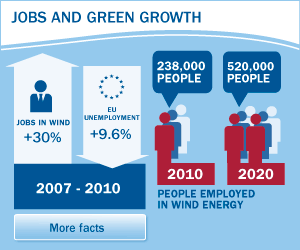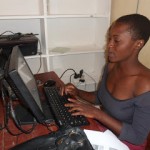Wind energy: empowering entrepreneurs in Africa
Last month the EWEA blog brought you the story of a small wind energy project in Tanzania and how it has helped to change the fortunes of some African farmers. Today, in this project update by Fran Witt from Renewable World, we look at how wind-powered electricity is connecting remote communities to the knowledge economy.
We all know that wind energy can light homes and businesses, but how about powering entrepreneurial spirit through education and information access?
Today, social and economic development is based on a “knowledge economy” in which access to knowledge is directly related to information and communication technology. However, as these technologies rapidly advance, the gap between the “information-haves” and the “information have-nots” continues to widen. In many low-income countries such as Tanzania, participation in even a full course of basic education is not universal.
The wind-solar hybrid project in Songambele, supported by Renewable World and its East African partner, the Arid Lands Information Network (ALIN), specifically addresses this digital divide, recognising that increased educational participation and achievement ensures that knowledge and skills can be harnessed to improve health, raise incomes, sustain economic growth and promote equity.
They have developed a “Maarifa” or Information Centre, powered by a 1kW turbine and solar panels. It contains books, CDs and perhaps most vitally computers with internet capacity. The Centre is used as a means to connect Songambele with its local region, with its country and with the world.
Developing business skills in the community
To encourage economic development and create business opportunities, adults and children alike are given basic technology skills. They have studied five modules: introduction to computers, Microsoft Word, Microsoft Excel, Microsoft Power Point, and Internet and E-mail. The students are able to use their training both to train others and to transform their own lives, and those of the community around them. Many of the young people who have taken the course hope to pursue further studies online and seek internet-related work, or set up their own businesses.
“The information and communication technology modules taught have been very useful to the community” said Herieth Sila, Maarifa Centre Field Office. “They have started applying them in different areas in their lives. Some of the youth trainees like Johari Farijala have already been booked for employment,” she added.
Zawadi Michael (pictured), is one of the first ‘graduates’ from the Maarifa Centre, and uses her new Excel skills to catalogue the Maarifa centre’s information resources in her role as Community Knowledge Facilitator.
The Maarifa Centre is a gateway to a new kind of future for local residents. You can help us bridge the digital divide and assist locals to set up new business initiatives. Click here to help us help someone transform their life.
This action is being promoted as part of Global Wind Day on 15 June. Find out more here.







